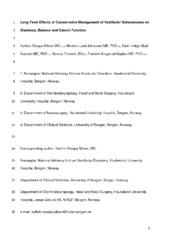Long-term effects of conservative management of vestibular schwannoma on dizziness, balance, and caloric function
Nilsen, Kathrin Skorpa; Lund-Johansen, Morten; Nordahl, Stein Helge; Finnkirk, Monica Katrine; Goplen, Frederik Kragerud
Peer reviewed, Journal article
Accepted version
Permanent lenke
https://hdl.handle.net/1956/22398Utgivelsesdato
2019Metadata
Vis full innførselSamlinger
Originalversjon
Otolaryngology - Head and Neck Surgery. 2019, 161 (5), 846-851. https://doi.org/10.1177/0194599819860831Sammendrag
Objectives: To study the development of dizziness, caloric function, and postural sway during long-term observation of untreated vestibular schwannoma patients.
Study Design: Retrospective review of a prospectively maintained longitudinal cohort.
Setting: Tertiary referral hospital.
Subjects and Methods: Patients with vestibular schwannoma undergoing wait-and-scan management were included—specifically, those who did not require treatment during a minimum radiologic follow-up of 1 year. Baseline data and follow-up included magnetic resonance imaging, posturography, bithermal caloric tests, and a dizziness questionnaire. Main outcomes were prevalence of moderate to severe dizziness, canal paresis, and postural instability at baseline and follow-up, as compared with McNemar’s test.
Results: Out of 433 consecutive patients with vestibular schwannoma, 114 did not require treatment during follow-up and were included. Median radiologic follow-up was 10.2 years (interquartile range, 4.5 years). Age ranged from 31 to 78 years (mean, 59 years; SD, 10 years; 62% women). Median tumor volume at baseline was 139 mm3 (interquartile range, 314 mm3). This did not change during follow-up (P = .446). Moderate to severe dizziness was present in 27% at baseline and 19% at follow-up (P = .077). Postural unsteadiness was present in 17% at baseline and 21% at follow-up (P = .424). Canal paresis was present in 51% at baseline and 56% at follow-up (P = .664).
Conclusions: There was no significant change in the prevalence of dizziness, postural sway, or canal paresis during conservative management of vestibular schwannoma, while tumor volume remained unchanged. This indicates a favorable prognosis in these patients with regard to vestibular symptoms.
